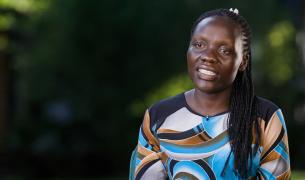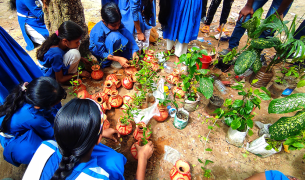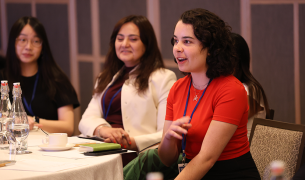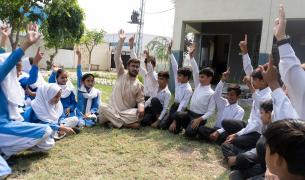Why Equity-Based Programmes are Key to Decolonising Education in Emergencies
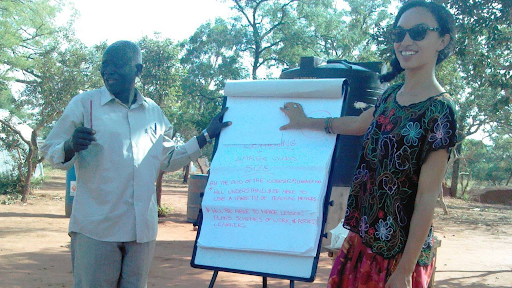
I once worked in a refugee camp in Ethiopia, where an international non-governmental organisation (INGO) received considerable funding to develop an early childhood education programme. Instead of building centres near community blocks, the organisation went for corrugated iron structures, which were cheaper and quicker to put up. However, as temperatures soared to 45+ degrees, the facilities were unusable after 10 a.m. In addition, families already had reservations about the formal education system and did not want their young children to cross the camp during the day. How different would this programme have been if it had been designed with the families, communities and children who would be attending these centres?
For a start, it would be more sustainable if the INGO had invested resources and processes to involve community members from the get-go in the programme design. Almost 20 years after the initial displacement, the camp is still there, and organisations continue to design responses on behalf of the population and local organisations. Across the humanitarian sector, the fact that the focus is on capacity building 'their' expertise and 'competencies', to manage education programmes that communities and local organisations have limited input into creating, without any acknowledgement that learning should be two-ways, is deeply problematic.
I think my commitment to valuing community cultural wealth stems from my experiences in education. As someone from a low income background, education gave me the opportunity to leave home, travel, and meet people from around the world. During my undergraduate degree I received a grant that enabled me to spend a year abroad in Cuba where I studied with students from Palestine, Brazil, Western Sahara Territories, and South Sudan to name a few, and all of them were scholarship holders. I saw first-hand education humanitarianism and I was inspired. Upon graduation, I trained as a secondary school teacher with Teach First in 2009, specialising in citizenship education because I believed (and still do) in the Teach For All network’s mission to tackle education inequity. Whilst in Cuba, I also realised that in the UK, ethnic diversity within the school teacher workforce is woefully low, and I thought it was important that teachers reflected London’s incredible diversity.
The Black Lives Matter movement and Covid-19 pandemic have forced long-overdue conversations around education inequity, anti-Blackness, anti-racism, power, and privilege across the globe, including the Education in Emergencies (EiE) sector. It is widely acknowledged that today’s humanitarian aid architecture became institutionalised following the collapse of Europe’s colonial empires, and that many colonial legacies remain. The EiE sector knows that systemic racial and intersectional inequalities continue to be part of the societies—and, therefore, the education systems—in which we work. Addressing educational marginalisation is complex, often with multiple interrelated and mutually reinforcing barriers. Yet for EiE, it will not be possible to tackle these issues unless those working in the sector also reflect on how it is complicit in exacerbating inequity through partnership models, staff recruitment, retention and progression, teacher professional development, pedagogy, community engagement, and accountability mechanisms shaping the classrooms, and ultimately, the educational experiences of children and young people.
I focus on advocating for equity-based, decolonial approaches in EiE because as a Black dual-heritage (Nigerian/British) woman, I grew frustrated and angry about the lack of diversity in EiE decision-making spaces, at INGO headquarters, in global inter-agency working groups, and at speaking panels at academic conferences. Black and Indigenous people and people of colour have long recognised that the intersection between race, gender, social class, and the passport you hold determines how you are valued in the humanitarian sector and whether your ideas will be taken seriously or not. Whilst I do not feel like I have a seat at the table, I fully acknowledge that my dual heritage, being cisgender, non-disabled, with a British passport and English mother-tongue, gives me a foot in the door where quite frankly, thousands are routinely excluded—the very people whose ideas, perspectives, and experiences would improve the way education is supported and inclusive in complex humanitarian crises. Embedding culturally-sustaining pedagogies, recognising and celebrating cultural wealth, and building programmes with instead of for emergency-affected teachers, parents, and learners are critical steps the EiE sector must take to develop equity-based education programmes. Luckily the tools are there.
I work with organisations, academia, and institutions to embed equity-based, decolonial frameworks and approaches into EiE research and programme design. I ask practitioners to reflect on their positionality (relative to privilege and oppression) in all aspects of their identities (e.g., race, class, gender, nationality, caste, religion, language, dis/ability) and how levers of privilege can dominate EiE responses. We also look at how often local knowledge, languages, expertise, and non-western educational theorists, pedagogies, and frameworks are integrated and influential in how education services are designed, delivered, monitored, and evaluated.
My work also spans EiE research and I believe that designing research with children, teachers, and communities offers a better and more ethical way to understand education experiences in crisis contexts. I realised the importance of youth participation during one of my first roles in the EiE field that took me to the Ajuong-Thok refugee camp in South Sudan, home to thousands of Sudanese refugees from the Nuba mountains. The students self-organised school councils, peer-study groups, girls clubs, and drama and debate clubs. They highlighted to me how important it is to celebrate youth agency, assets, and unique needs, and for organisations to put in place structures that ensure that diverse groups of young people have critical roles in designing, reviewing, monitoring, and challenging humanitarian programmes. After all, forcibly displaced young people (and teachers) have first-hand experience growing up in increasingly diverse cities, multi-ethnic refugee camps, and internally displaced and informal settlements, with an unprecedented variety of cultures, identities, faiths, and languages—their voices should be the loudest at the table. Unfortunately, adolescents and youth have few opportunities for education in emergencies, and with less than 3% of refugee learners accessing higher education globally, more needs to be done to make sure all young people have opportunities to access, progress through, and thrive in educational settings.
With global displacement at an all-time high, and more children growing up in crisis-affected contexts, the EiE sector has a tremendous opportunity—and responsibility—to mobilise efforts to do the hard work of rooting out structural inequities. For those working in EiE, this will mean having difficult conversations, reflecting, and readdressing systems, structures, and approaches to strive for quality, inclusive, and protective learning environments. The coronavirus is already transforming the world—let's choose to direct that transformation towards greater social justice and educational opportunities for all.
Learn more about Jessica’s work and the efforts of teachers and alumni across the Teach For All network to support Education in Emergencies.
In November, the Collective for Decolonising Education (CEDE!), which Jessica co-founded, will be hosting its first online conference focused on EiE. Learn more
